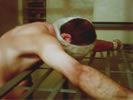Eye For Film >> Movies >> Ghosts Of Abu Ghraib (2007) Film Review
In 1961, psychologists conducted an ‘obedience study’, putting people in control of giving those on the other side of a partition increasingly painful electric shocks. What the ‘punishers’ didn’t know was that those they were hurting were actors, howling for the part. That they weren’t actual victims was just as well, since the psychologists found that, if people were ordered to shock the subject on the other side of the wall, very few would disobey even when they could hear their victim screaming in agony.
This is the jumping off point for Rory Kennedy’s swingeing attack on the Bush administration’s involvement in the atrocities at Abu Ghraib, which only came to light after pictures of squaddies humilitating, degrading and torturing prisoners were leaked. The question that is never spelled out, but forcefully implied, what does it take to make regular Joes do bad things?

Speaking to several of the key players from the incidents that shook the world, including perpetrators, victims and former US Justice Department counsel John Yoo (in the role of Government apologist), a picture is a painted, not of evil torturers but of confused, often not very bright kids, who were petrified and who came to believe that by ‘softening up’ the prisoners by making them stand, strip or generally humiliating them they were some how doing the right thing and, more importantly, the thing their country wanted.
One of the former military police soldiers says: “You go from being a docile guy… once you’ve been in Iraq you become a robot.”
Another says: “I was afraid I would get lost.”
Certainly there seems to have been plenty of scope for those policing Abu Ghraib to lose their grip on reason. The prison was clearly undermanned, with just 300 soldiers in charge of around 6000 inmates, held in the filthiest of conditions. In addition to the squalor dehumanising the inmates, Kennedy’s film suggests there was a ‘drip-feed’ of encouragement trickling down from above.
Perhaps the single most stinging indictment on the White House was that they sought to redefine the term ‘torture’, claiming that the definition laid down by the Geneva Convention of Human Rights was “ambiguous”. Try not to laugh hollowly at that notion when you read the following definition from the Convention: “torture means any act by which severe pain or suffering, whether physical or mental, is intentionally inflicted on a person for such purposes as obtaining from him or a third person information or a confession”.
By “removing ambiguity” from the word “severe” – because, hey, no one knows what that means, right?! - the US Government came to define torture in its most narrowest of terms – in that for an act to be so described the perpetrator would have to either be chopping off a part of a person’s anatomy or actually be in danger of causing imminent death. This, of course, left the field wide open for any number of human rights abuses, several of which were caught on camera. As the author of A Question Of Torture: CIA Interrogation, from the Cold War to the War on Terror Alfred McCoy succinctly puts it: “There is no such thing as a little bit of torture.”
Kennedy’s film paints a comprehensive picture of incompetence and negligence, coupled with a staggering amount of ‘looking the other way’ by more senior personnel. When an order came to “Gitmoize” the prison – in a reference to methodologies practiced at that other hotbed of human rights concern Guantanamo Bay, things just went from bad to worse.
By coupling the words of those soldiers who were essentially hung out to dry by the military with harrowing testimony from some of the victims – ‘We listened as his soul cracked,” says one distraught former inmate – Kennedy creates not an apology for those who performed the atrocities but rather sets them against a backdrop of an administration which didn’t care a jot about the rights of others. She is careful and thorough, and - unlike many documentarians who come at a subject with an agenda in mind - tries to offer some balance in the form of Yoo's testimony.
What emerges is a long way from the “animal house on the night shift” picture the Pentagon tried to present in the wake of the scandal, with Kennedy showing a much more endemic condoning of extreme measures in the aftermath of 9/11. What really chills your blood is the suggestion this may well not be an isolated incident – and prompts you to think about what is happening, even now, in Iraq as we sleep at night. Damning, detailed and definitely a documentary everyone should watch.
Reviewed on: 16 Feb 2007


















